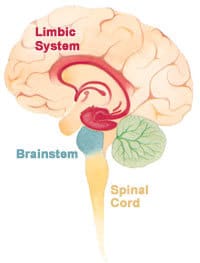The human brain is physically complex. The human mind is conceptually complex. A useful insight is gained by noting which organisms first showed reflexes, instincts, habits, and choices. These behaviors show milestones in thought.
Neural Net
Developed in invertebrates about 3.5 billion years ago.
An invariable response to a stimulus is the extent of the behavioral repertoire. Also called as a reflex. The organism reacts immediately to the environmental stimulus. There is no decision. The action always occurs. It is unaffected by other environmental elements.
Brainstem and Cerebellum
Developed in fish starting about 500 million years ago, atop the spinal column (Paul D. MacLean, developer of the Triune Theory, combined these with the spinal column naming them the reptilian brain).
The response to an exterior stimulus is not invariable. Multiple sensory inputs are considered in a behavioral response. The maintenance of life-supporting conditions (food, water, air, etc.), homeostasis directs actions.
This stage delivers instincts. The organism typically reacts in a regular manner, but that may be altered by other environmental factors.
Limbic System
Developed by mammals about 150 million years ago, the limbic system sits atop the spinal column and the brainstem.
The limbic’s hippocampus supports long-term memory, beyond the immediate situation. With this memory, the organism can relate situations and prior actions to likely results. The relative satisfaction of 3S Imperatives (Satiety, Sex, and Safety) result in motives we call emotions.
These behavioral choices result in regular responses, driven by emotions which usually only results in partial satisfaction of the 3S Imperatives. This type of response is a habit.
Neo-Cortex
Developed in primates, with especial rapid expansion the last 2-3 million years, the neo-cortex sits atop the brainstem and the limbic system.
With increased neurological capacity to consider additional responses to real-time reactions, planning for better future results occurs. This becomes more successful as more experience is gained.
This stage delivers reasoned choices which sometimes can override emotional choices.
Milestones in Human Thought
The abilities developed in recent hundred thousand years—language, consciousness, writing—rest on the reflexes, instincts, habits, and choices that continue to handle the more primitive demands of our existence.
3S Imperatives, Emotions, and Consciousness Evolutionary details

